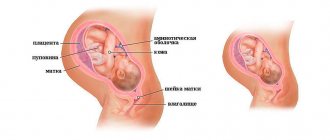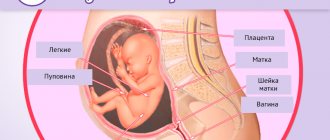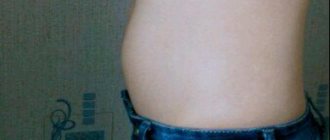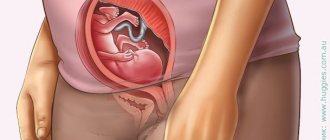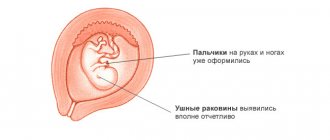How to determine the gestational age?
Two months after conception, the woman already knows about her interesting situation, and the question may arise as to what the true duration of her pregnancy is now; in other words, how many months and how many weeks. To correctly calculate this period of time, you need to know two determination methods.
- Embryonic period Otherwise called the period from the moment of conception. It is based on counting the beginning of pregnancy from the 1st day of the last menstruation with an addition of 14 days (with an average female cycle of 28 calendar days). This method is used by women who track the appearance of their ovulation and plan their pregnancy.
- Obstetric term In the antenatal clinic, the doctor uses exactly this method of calculating the term. Since most couples do not know the exact date of conception, the pregnancy countdown usually begins on the 1st day of a woman’s last menstrual period. It is on this date that the expected date of delivery is set and the start of maternity leave is calculated.
Based on the foregoing, we note that the 9th obstetric week is equal to the seventh week from the moment of conception. This means that the woman had her last menstrual period 9 weeks ago.
How does a baby develop in the 9th week of pregnancy?
The third obstetric month is a very important period of pregnancy. At this time, the future baby’s main organs and vital systems are formed. The baby is now the size of a small strawberry. The head of an unborn baby on ultrasound resembles the head of an adult. If you are lucky, then during the study you can catch the moment when the baby is trying to suck the thumb of his tiny hand.
| Development parameters | Average normal values (at this time) |
| Fetal weight | 2-3 g |
| Fetal size (distance from crown to rump) | ~ 20 – 30 mm |
| Length gain per week | 6 – 8 mm |
What are the developmental features of the baby at this stage?
- The first movements occur inside the mother's tummy. By the middle of the third obstetric month, the first muscles and rudiments of the nervous system of the fetus are formed. The movements of the embryo are still very primitive - these are muscle contractions in response to nerve impulses, but after a couple of weeks the baby will actively move in the uterus and change the trajectory of movement.
- The total length of the baby can already be as much as 8 cm, and its weight still fluctuates around 3 g. Growth continues, the child rapidly consumes the mother’s calcium to build and strengthen its future skeleton.
- The most important organs of vision and hearing continue to develop. The eyes can already be seen on an ultrasound examination; they are covered with the thinnest film of the eyelids. Day after day, the outlines of the nasal fold and fossa, the auditory eminence appear, and the internal sense organs are formed.
- The upper limbs of the fetus are improving at a rapid pace, they are lengthening, the dividing groove between the tiny fingers is outlined, the thumb of the developing hand is highlighted, and the interdigital spaces are designated. The lower limbs grow at a slower rate.
- With the help of the first tactile receptors, the fetus senses touch on the skin. They appear at the level of development of the baby's tiny mouth. One of the first senses that a child develops inside the womb is touch, which appears already in the ninth week of its existence.
Fetal development at 9 weeks
Appearance:
- Growth reaches 2-3 cm; weight ranges between 3 - 5 grams;
- The baby's head gradually acquires typical shapes, but still does not look proportional to the baby's body;
- The child’s neck begins to develop, the spine straightens, and the “tail” turns into a tailbone;
- The baby’s eyes are still closed (they will begin to open at 28 weeks of pregnancy, be patient);
- You can already notice the cartilaginous auricles and barely noticeable, but already beginning to form, earlobes ;
- The corners of the fetal mouth become thinner, the edges become thicker, and the mouth already resembles lips ;
- The child's limbs lengthen, the fingers grow and become more like the fingers of a newborn;
- Elbows form;
- The feet become enlarged;
- As a result of the compaction of the epidermis, the baby’s marigolds are already visible , which first appear on the side of the palms and soles, and then move to the tips of the fingers and toes.
Formation of organs and systems (organogenesis):
- Parts of the brain and central nervous system are formed;
- , a part of the brain stem located at the back of the skull and regulating body balance and coordination of movements, develops
- The middle layer of the adrenal glands is formed, which is responsible for the production of adrenaline;
- The pituitary gland is located in the brain , which influences the growth, development, and metabolic processes of the body;
- The thyroid gland begins to function;
- Such parts of the nervous system as nerve ganglia, cranial and spinal nerves are also formed;
- The muscles of the mouth begin to function, and now the baby can move his lips, open and close his mouth;
- He is already able to swallow the liquid in which he is located. The swallowing reflex is the very first reflex that a baby develops;
- The abdominal and chest cavities increase in volume, and the heart no longer protrudes ;
- The child develops rudiments of the mammary glands;
- In the lungs, the development of the bronchial tree (that is, its branching) is already observed;
- The umbilical cord does not remain unchanged, it also grows and develops;
- The fetal heart continues to develop and already makes about 130-150 beats per minute and drives blood through barely formed blood vessels;
- An interatrial septum is formed;
- The first cells that are responsible for immunity - lymphocytes - begin to form in the baby’s blood;
- The child's lymph nodes are blocked;
- The baby's kidneys begin to work actively , which remove unnecessary substances through the mother's body;
- The baby is already developing genitals. If your baby is a boy, then his testicles are already formed, but they are located in the abdominal cavity, and after a while they will descend into the scrotum.
Formation of the placenta. At the beginning of the third month (that is, just at the 9th week), the placenta begins to fully function. It is a “means of communication” between the mother’s body and the baby’s body. Through the placenta, the mother can adapt to the needs of her little belly.
The placenta is a very responsible organ that protects the baby. It is necessary to mention that the placenta has two surfaces: maternal and fetal. The fetal surface of the placenta prevents the fetus from drying out and damage, since it is completely covered with an aqueous membrane, i.e. amnion.
At 9 weeks, communication between the mother and the unborn baby begins, as signals are sent from the baby’s brain, notifying the mother of her needs and needs. It is for this reason that very often pregnant women give preference to foods and drinks that they previously could not stand.
What happens to the mother's body at 9 weeks
The third month of bearing the baby has begun. The woman is already aware that pregnancy has occurred by this time. The body is experiencing major hormonal changes. It is possible that at week 9 a pregnant woman experiences manifestations of early toxicosis.

| Parameters of a pregnant woman | Indicators for this period |
| Weight gain at current stage of pregnancy | ~ 0.2 – 0.5 kg |
| HCG level at 9 weeks | 28000 – 260000 IU/ml |
| Norm of progesterone in the first trimester | 25 ng/ml (80 nmol/l) |
How does a woman feel during this period?
- The belly is growing quite quickly, already the 8th week of pregnancy makes you feel a certain pressure on the spine. But if you compare the photo of the belly of the current week with the previous one, you still cannot see a noticeable increase. At week 9, you have to look for a comfortable position in order to ease the discomfort that arises when muscles are tense.
- Changes in mood occur. Now there can be just one step from tears to laughter (as well as in the opposite direction too). The most stressful in this regard is the first trimester of pregnancy. It is worth remembering this and smiling more often: the baby feels that he has a happy mother, is calmer and develops better.
- The mammary glands grow, and the skin does not have time to stretch along with the increasing volumes. As a result, tears in the inner layers of the skin, otherwise called stretch marks, may appear. Measures should be taken now to prevent their formation - massage using special products for pregnant women.
- You may experience nagging pain in the lower abdomen. This is how increased uterine tone manifests itself. If your lower abdomen hurts, your doctor will advise you to avoid physical activity and temporarily limit your sex life.
- Toxicosis, which appeared a couple of weeks ago, is gaining strength. Those dishes and smells that used to bring pleasure now seem unbearable. It’s worth listening to your body, understanding what it likes at the moment and what you should give up.
Is it possible to have sex at this time?
Sexual life throughout the first trimester should be non-aggressive. An important condition is that the process should bring pleasure to the expectant mother. Hormonal changes can provoke a decrease in female libido, so the mutual desire of both partners plays a big role in this matter. A specialist may place restrictions on the continuation of lovemaking if a pregnant woman observes increased uterine tone, as well as if the expectant mother has an STD that requires sexual rest during treatment.
Nutrition of the expectant mother at 9 weeks
It is at the 9th week that the fetus’s rapidly developing brain begins to send signals to the mother about its needs. Many experts have come to the conclusion that the dietary eccentricities of pregnant women are associated precisely with this factor. Appetite may appear or disappear altogether, but at each stage of development, the child needs a balanced diet. If at the beginning of pregnancy it was possible to neglect the diet and eat as before, then this week the mother’s diet should already contain all the necessary substances: carbohydrates, proteins, fats, minerals and vitamins. To increase the overall tone of the body, it is necessary to include iron-containing foods, protein foods, nuts and grains, as well as vegetables and fruits in the menu.

A diet rich in foods containing folic acid (spinach, asparagus, lettuce, liver, carrots, egg yolk, cheese, pumpkin, melon, apricots, beans, etc.) will help avoid birth defects. Don't indulge in unhealthy foods and drinks, even if you really want to. Too fatty and fried foods will lead to heartburn, sweet and starchy foods will cause constipation, coffee and carbonated drinks will have a bad effect on the nervous system and increase the load on the kidneys. A pregnant woman should avoid eating undercooked meat, unpasteurized milk, lightly salted and raw fish, soft cheeses, raw eggs, unwashed vegetables and fruits - these foods can cause listeriosis, which manifests itself in the form of diarrhea, nausea, vomiting and can lead to injury. fetus
Maternity consultation: examinations and examination at 9 weeks
In the ninth week, the expectant mother undergoes a “basic” examination plan at the antenatal clinic, which includes registration, collection of health information and a certain range of laboratory tests: a general urine and blood test, a vaginal smear for flora, tests for HIV, syphilis and hepatitis viruses, undergoes PCR diagnostics.

If the pregnancy proceeds without complications, in the first trimester the woman needs to attend a consultation once a month. You should conscientiously listen to the doctor’s instructions and take the required tests on time.
What is important to pay special attention to:
- do not refuse hospitalization if the gynecologist suggests going to the hospital to continue the pregnancy. Drug treatment and strict bed rest will help prevent negative developments in time;
- undergo an ultrasound examination to rule out deficiencies in the development of the fetus, and if they are present, correct them before the baby is born;
- Be sure to inform the specialist observing you about any concerns or deviations in your health.
Ultrasound at 9 weeks
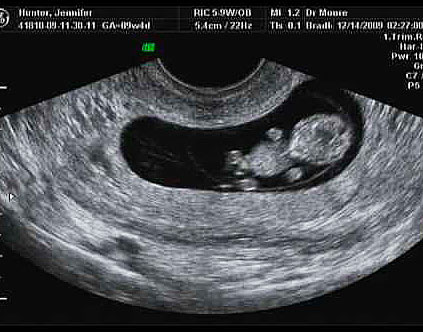
Pain at 9 weeks of pregnancy
At the 9th week of pregnancy, almost all expectant mothers experience rather unpleasant sensations in the buttocks, which intensify while walking. This symptom indicates a pinched sciatic nerve, which is caused by an enlarged uterus. This condition does not require treatment: the discomfort will gradually go away on its own. To reduce pain, doctors recommend not sleeping on your back and not making sudden movements. Wearing a special bandage also helps a lot.
This is interesting: How to wear a bandage at 9 weeks of pregnancy
Cramping, nagging pain in the lower abdomen should cause great concern. At the same time, bleeding may occur. Such symptoms indicate the onset of a miscarriage. If you feel these signs at 9 weeks of pregnancy, immediately go to bed and call an ambulance!
Abdominal pain at 9 weeks of pregnancy can be caused by intestinal problems. There is no need to worry: as a rule, in this case, the doctor prescribes No-shpa .
Nutrition for a pregnant woman in the first trimester
The main rule in a woman’s diet in early pregnancy is moderation, common sense and reduced salt intake. In the third month of bearing a child, it is better to give up coffee, strong black tea, baked goods, mushrooms, legumes, and highly carbonated drinks.

You need to eat often enough - at least 4 times a day. Don’t forget about water; the expectant mother needs to drink at least 2 liters of liquid per day. This can be either drinking water, or drinks and decoctions of berries, cranberry juice, dried fruit compote, rosehip infusion and mineral water.
It is useful to include black bread, various cereals, whole grain pasta, as well as fresh or baked vegetables and fruits in your diet.
Here's what a sample menu might look like in the ninth week of pregnancy:
| Eating | Food and drink options |
| First breakfast | Omelette with herbs, natural yoghurt with bran, green tea with honey |
| Lunch | Ham and cheese sandwich, hot chocolate or cocoa |
| Dinner | Chinese cabbage and cucumber salad, cream cheese soup with sour cream, croutons with peanut butter, tea with mint and lemon balm leaves |
| Afternoon snack | Cottage cheese with condensed milk, berry jelly |
| Dinner | Boiled potatoes, baked chicken fillet with tomatoes, a portion of apple pie, rosehip infusion with orange |
| Before bedtime | Biscuits, apple, glass of fermented milk drink |
Toxicosis and how to deal with it at 9 weeks
Toxicosis is an unpleasant and often inevitable phenomenon that pregnant women face. The thing is that the body of the expectant mother undergoes a variety of changes. Your state of health is literally on the border between normal and pathological, at this time the following may be observed:
- morning vomiting and nausea;
- slight (up to 37.5°C) increase in temperature;
- food cravings;
- hypotension (low blood pressure);
- frequent unmotivated mood changes;
- insomnia, or, conversely, drowsiness;
- loss of appetite, dizziness, etc.

The 10th week of pregnancy can please you with a decrease in noticeable discomfort, and by 12-14 weeks the above complaints completely disappear in the vast majority of women. However, anyone can make their life easier now by organizing a special lifestyle and diet. Important!
If toxicosis is accompanied by general weakness, weight loss of 3 kg or more, and frequent vomiting, then it requires drug correction.
So, here are the top 7 tips to cope with toxicosis.
Tip 1. Reduce personal involvement in cooking to zero
At first, it is advisable not to even appear in the kitchen where someone is preparing food. Exacerbation of toxicosis is primarily associated with an exacerbation of the sense of smell. The smell of food released during the cooking process causes irritation of the sensory system and nausea occurs. If you still have to cook it yourself, it is better to process food in the first trimester in a way that does not require the constant presence of the hostess. Stewing in pots or a slow cooker, baking, boiling under a tightly closed lid - excellent! Moreover, these cooking methods are the most beneficial for the nutrition of a pregnant woman.
Tip 2. Organize the transition to frequent split meals
Everyday eating according to the principle “breakfast - lunch - dinner” should be changed during toxicosis. The digestive tract now works in a special mode, and long breaks between meals become an unbearable burden, provoking symptoms of toxicosis. However, it is not necessary to completely revise your diet. It is enough to divide your usual dishes into small parts and eat them evenly throughout the day. A suitable diet for toxicosis is a small portion (no more than 150 g) every 1.5 hours throughout the day.
Tip 3. Eat mostly what you want
You can “outsmart” toxicosis and avoid provoking nausea in a simple way - eat what your body requires. Even if it is not the healthiest food, it is better than provoking vomiting or refusing to eat at all. Perhaps you will find the dish you want from those that are best digested during this period. These are low-fat, cool, perhaps slightly sour foods: grapes, citrus fruits, fruit yoghurts/mousses/ice cream, soft curd cheeses, chilled soups (beetroot soup, okroshka), boiled turkey or veal.
Tip 4. Avoid heavy meals
Unfortunately, there are “dangerous” dishes that can cause an exacerbation of even mild toxicosis. Many of them are part of the everyday menu, for example, scrambled eggs and bacon, cutlets, fried meat, fried pasties and pies, fatty pilaf, fast food, butter, cakes and pastries with lots of cream. Hot and spicy dishes are also on the “black list” during toxicosis.
Tip 5. Eat in a certain position
It may seem strange, but eating in a reclining position actually helps reduce nausea. This is due to changes in the location of the esophagus and stomach. Allow yourself to lean on the back of a chair or sofa during lunch. You should not rush to get up immediately after eating - this way you have a better chance of digesting the food you eat. This method has proven itself to be effective against frequent attacks of vomiting and nausea in pregnant women in the early stages.
Tip 6: If you have morning sickness, eat an apple without getting out of bed.
This can be any fruit that will lie in a vase on the bedside table. Slices of apples, pears, fruit chips, grapes or even nuts will prevent the onset of lightheadedness that appears after sleep, as soon as you get out of bed. Make it a habit to have a light snack in bed during the first trimester, and you will notice how you feel much better in the morning.
Tip 7: Always have water and a snack with you
A couple of sips of a pleasant liquid can be a life-saving measure in case of a sudden lump in the throat. During this period, lightheadedness can follow literally everywhere - in a stuffy room, in transport, in the office, when a colleague is heating up a container of home-made food. Lemon water, chilled mint infusion, and simple green tea will support your strength. Fermented milk drinks help many people: kefir, ayran, tan. Mint-flavored lollipops, menthol chewing gum, and dried fruits will help suppress a persistent attack.
Fighting toxicosis
In all situations, it is important to understand the problem and accept it. So, a woman does not make the decision to have a baby alone. This means that the husband is one way or another ready for future fatherhood. It is important to tell the man as much as possible about sensations, experiences, and how exactly the fetus develops. He must feel involved in this amazing process. This brings the couple closer together and helps the woman not feel lonely.
You will have to realize that during pregnancy you need to give up smoking, alcohol, and intense sports. But this is solely for the benefit of the baby. In addition, after the baby is born, most habits can be returned to.
There is no need to worry about material expenses. Of course, you will need a lot of money for the baby, however, as a last resort, you can always find a part-time job. Don't forget about your relatives. As a rule, grandparents are happy to help. Friends often have strollers and other baby accessories that they can happily pass on.
As for beauty, if you wish, you can regain a decent figure within a few months after the birth of your child. How a woman takes care of herself during pregnancy also matters. If she does not allow herself to eat too much, most likely, the gained kilograms will gradually go away even without much exercise after childbirth.
Speaking about a career, it is important to mention that a woman’s main goal is still a strong family. Even if she clearly intends to build a career, her age still allows her to do this and several years later than originally planned. In addition, most employers have great confidence in married women who already have a child. They believe that this speaks of responsibility and the ability to plan.
If a girl has had experience with unsuccessful pregnancies, it is often difficult to get rid of psychological fear. With such problems, psychologists advise remembering that no two pregnancies are the same. Having experienced grief does not mean that the subsequent pregnancy will be difficult. It happens quite the opposite, because this time the woman will take the carrying of the baby more responsibly.
It is important not to listen to the numerous advice of friends, not to believe scary stories about the birth of friends, not to pay attention to superstitions and omens. A baby at 9 weeks of pregnancy is still so vulnerable, try to drive bad thoughts away. Psychologists say that emotional stability is a platform for a healthy pregnancy.
When toxicosis only causes inconvenience to a woman, medications should not be used to combat it. You can try to get rid of annoying nausea on your own.
We recommend How often to visit a doctor during pregnancy?
Nutrition tips for toxicosis
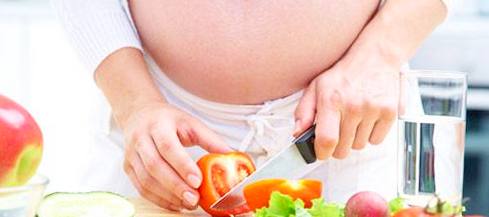
Eat more vegetables and drink water if you are not prone to swelling
Tips for getting rid of toxicosis:
- It is not recommended to get up on an empty stomach. A glass of fresh juice and cookies will help avoid nausea.
- It is important to eat frequently. You shouldn't eat a lot, it will cause vomiting. It is better to exclude spicy and sweet foods.
- It is important to maintain emotional balance and avoid stressful situations.
- You can go for a walk every day before going to bed. This will not only reduce the manifestation of toxicosis, but will also help you fall asleep better.
The food should contain more vegetables and fruits. They will help maintain energy, maintain good shape and, of course, supply the fetus with vitamins for proper development. When there is no tendency to edema, you can drink a lot of water.
If you have toxicosis, it is advised not to drink carbonated drinks, and not to eat spicy or overly salty foods. It is also believed that dried apricots help suppress the gag reflex.
Ailments and pain at 9 weeks
Pregnancy is called an “interesting situation” for a reason. The female body is being rebuilt in a new way, and it is not always possible to avoid unpleasant symptoms. Many of them manifest themselves as true signs of pregnancy.

What can worry a woman in the early stages?
| Morning sickness | The peak of toxicosis occurs at 9-10 weeks. In the presence of vomiting, insufficient amounts of vitamins and nutrients may reach the fetus. Low blood sugar can make the situation worse. |
| Constipation | Hormonal changes weaken the muscle activity of the intestines. To avoid hemorrhoids in the near future, you should take preventive measures: start leading a more active lifestyle, consume muesli, dried fruits, apples and still mineral water. |
| Pain in the back and perineum | From the first weeks of pregnancy, the body begins to prepare for the birth of a child. The bone joints in the pelvic area become more flexible. This may cause pain in the lower back and perineum. If the lower back is pulled and the discomfort is very disturbing, it is important to bring this to the attention of your gynecologist in a timely manner. |
| Vein expansion | If a woman had varicose veins before pregnancy, then in an interesting condition it can worsen even more in the early stages. A sedentary lifestyle contributes to this. To strengthen the walls of blood vessels, you need to find time to do gymnastics. |
| Thrush | This infection causes pain and itching in the vagina, and copious discharge. To cure thrush, you need to undergo the therapy prescribed by your doctor together with your partner. For better results, it is important for a woman to exclude sugar and dishes prepared with yeast from her diet. |
| Throat diseases, sore throat | In the first months of bearing a child, a woman’s immunity is weakened, so if she is exposed to hypothermia or comes into contact with a large number of people, she may develop a sore throat or acute tonsillitis. If your tonsils are enlarged and your temperature rises, you should call a doctor. Timely treatment will help avoid complications. |
In what cases should you definitely consult a doctor:
- the appearance of discharge, especially pink-red or brown;
- when urinating, there is discomfort, pain and burning, you want to go to the toilet more often than usual;
- sharp pain occurs in the side, lumbar region, lower abdomen;
- pain in the kidney area bothers you and does not subside when you change your body to a more comfortable position;
- regular headaches, fever, chills occur;
- complete loss of appetite, nausea more than 5 times a day;
- In urine tests, red blood cells, white blood cells, bacteria are increased, and protein is present.
Note!
If during pregnancy you feel one of the above symptoms, you should contact your gynecologist and local physician as soon as possible to clarify the diagnosis and subsequent treatment.
What can be done to prevent health?
To prevent the development of pathological situations and exacerbations in the first trimester, it is important to follow simple rules:
- register with the antenatal clinic in a timely manner;
- strictly observe the rules of personal hygiene;
- eliminate stressful situations;
- protect yourself from hypothermia and treat existing inflammatory processes in the body.
If the ailment cannot be avoided, drug therapy should be selected only by a general practitioner in collaboration with a gynecologist.
Note!
Self-medication can lead to serious health problems for the expectant mother and negatively affect the baby’s intrauterine development.
Fetus at 9 weeks of gestation and its development
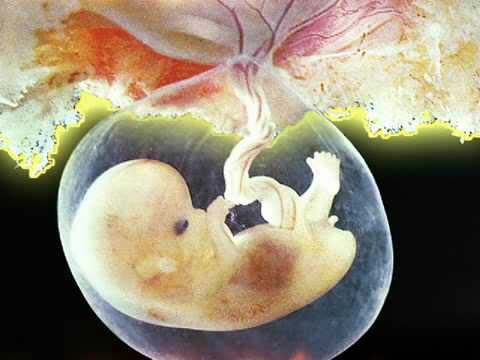
Pregnancy 9–10 weeks is a period of very active development of the central nervous system. The cerebral hemispheres are formed, the cerebellum is formed. Soon the baby’s movements will become purposeful. But now he can move his arms and legs, and if he is near the wall of the uterus, he pushes away from it, like in a pool. The baby can even make swallowing movements.
The formation of spinal ganglia and nerve trunks occurs. The pituitary gland is formed in the baby’s brain; it already produces hormones.
The formation of the lymphatic system begins, which is responsible for cleansing the body of metabolic products, toxins, and also performs an immune function.
The muscular system develops. The baby's limbs become thicker and movements intensify. Large joints are formed. The baby's arms are now somewhat ahead of the development of the legs, so in the early stages they are longer. The hand is being formed: a palm is formed, the fingers lengthen, and the membranes between them gradually disappear. The buds of the marigolds begin to form, so far in the form of a thickening of the epidermis.
Important changes occur in the baby’s respiratory system: the bronchial tree begins to branch. The main bronchi are formed.
Heart formation continues. Now it contracts at a frequency of 130–150 beats per minute.
The embryo's back gradually straightens and its tail disappears. His head is inclined towards his body, and is still unusually large. The baby's eyes have already formed, but for now they are closed for centuries. The light and color sensitive receptors of the retina have not yet been formed; they are formed at a later stage.
At this stage, the placenta is well formed, and the baby is actively receiving all the substances it needs. And the mother must definitely take this into account - you need to strictly monitor your diet, despite the nausea and aversion to some dishes.
At the end of the first trimester, the placenta begins to function. It is she who regulates the metabolic processes between mother and baby. The placental barrier prevents many harmful substances from reaching the baby. It protects the baby and provides it with all the necessary substances.
Reasons why a doctor may put you on preservation at 9 weeks
The prospect of treatment in a hospital while feeling normally will not please a pregnant woman much. It may seem that the doctor is simply playing it safe, although there is no reason to worry. In fact, there are many situations where close specialist supervision is required during pregnancy. For example, the presence of chronic diseases (diabetes mellitus, rheumatism, hypertension). There are six most common reasons for early hospital treatment.

| Pathological miscarriage | If a woman has a history of two or more miscarriages, a diagnosis of miscarriage is made. There can be many reasons for it, from hormonal deficiency to cervical incompetence. The treatment tactics are chosen by the gynecologist; he can prescribe hormonal medications or apply a special suture to the cervix until childbirth. |
| Presence of interruption threat | Pain in the lower abdomen accompanied by bleeding is definitely a reason to go to the hospital. The doctor will try to relieve the increased tone of the uterus and determine what is happening to the baby and mother. |
| Toxicosis in the early stages of gestation | Uncontrollable vomiting with dehydration and weight loss is stopped in the hospital with the help of IVs. |
| Pyelonephritis | An inflammatory process in the kidneys occurs during pregnancy, often due to pressure from the uterus on the ureter. Fever and lower back pain require medication and medical supervision. |
| Polyhydramnios and oligohydramnios | If there are problems with the amount of amniotic fluid, the patient in position often needs a comprehensive examination and anti-inflammatory therapy, which cannot be provided at home. |
| Multiple pregnancy | Double or triple joy in critical periods (especially before 10-12 weeks) can be overshadowed by the identification of pathologies in the development of one of the children. To avoid this, if there are concerns, doctors recommend going to the hospital to prevent pregnancy and monitor the development of the fetus. |
What does it show?
By doing an ultrasound at 9 weeks of pregnancy, you can see an accurate picture of the course of pregnancy. Diagnostics reliably provides data on the condition of the woman’s internal organs and the characteristics of the fetus, without complicating interventions. Exposure to waves does not affect intrauterine defects.
When undergoing an ultrasound examination, the following indicators can be identified:
- exact gestational age;
- number of embryos in the uterus;
- area of attachment of the fertilized egg;
- embryo mobility;
- detection of uterine pathology;
- compatibility of placenta and fetus.
Reference! If a specialist finds negative changes, he will definitely order a repeat study.
